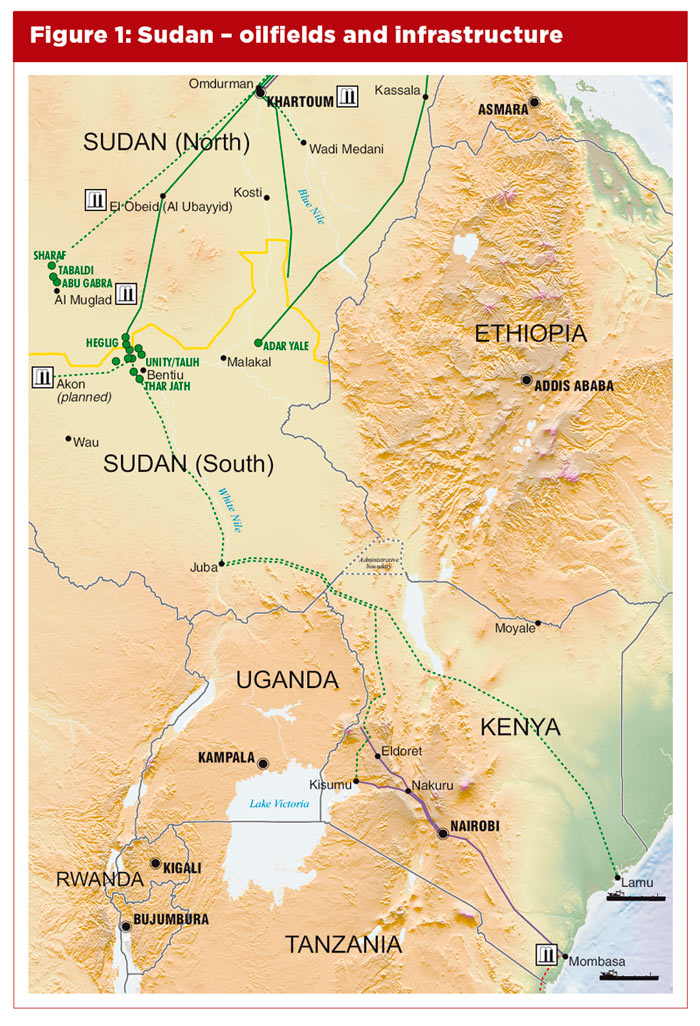- Washington “follows with interest” Morocco’s openness onto Africa (John Kerry)Posted 11 years ago
- The trial of South African Paralympic champion Oscar Pistorius opened in Pretoria on Monday.Posted 11 years ago
- USA welcomes efforts of King Mohammed VI in MaliPosted 11 years ago
- Egypt’s population reaches 94 millionPosted 11 years ago
- Mugabe celebrates his 90thPosted 11 years ago
- Moroccan Monarch to Build a Perinatal Clinic in BamakoPosted 11 years ago
- King Mohammed VI handed a donation of bovine semen for the benefit of Malian breeders.Posted 11 years ago
- Moroccan King’s strategic tour to Africa: Strengthening the will of pan African Solidarity and stimulating the south-south cooperation mechanisms over the continentPosted 12 years ago
- Senior al-Qaida leader killed in AlgeriaPosted 12 years ago
- Libya: The trial of former Prime Minister al-Baghdadi AliPosted 12 years ago
Practical obstacles may delay resumption of South Sudan’s oil exportation through Sudan

As Sudan and South Sudan declared commencement of arrangements to resume exportation of South Sudan’ s oil through Sudan’s infrastructure, observers said technical difficulties might delay the process for a few months.
Officials and oil experts believe that there are technical barriers that could hamper the resumption of South Sudan’s oil exportation which could delay the process for more than three months.
“Definitely there are technical problems that could delay the process for months,” Elisabeth James Bol, South Sudan’s Deputy Minister of Petroleum.
“We have instructed oil companies operating in South Sudan to work out a plan to resume oil pumping and we are waiting for their viewpoints. However, the technical reports we received indicated that oil production could be resumed in six to nine months,” she added.
Nevertheless, Sudan’s former State Minister for Oil Ishaq Bashir Jamma downplayed the consequences of the sudden stoppage of South Sudan’s oil production, noting that it won’t have any impacts on the carrying pipeline.
“The Sudanese government has removed the remaining crude oil from the pipeline and filled it with chemically processed water immediately after the stoppage of the oil production, which prevented any effect on the quality of the carrying pipeline,” Jamma told Media Wednesday.
The former Sudanese minister noted that operating the pipeline again won’t need complicated technical operations, explaining that it would only need to remove the chemically processed water and replace it with crude oil as no technical harm has been inflicted on the pipeline.
“The pipeline has been designed in a manner that it wouldn’t get affected by any sudden stoppage whether due to operational faults or others,” he explained.
He further pointed out that the technical preparation centers of the Sudanese government have actually embarked on preparing the carrying pipeline, which would not take more than three months at most.
The Sudanese oil pipeline extends for around 1,600 km and passes through seven Sudanese states before reaching the main Port Sudan harbor in eastern Sudan.
In the meantime, Yassir Abbas, an independent oil expert, for his part believed that the preparation for the carrying pipeline to be operated again needs more than four months.
“The pipeline extends for more than 1,500 km with a circular diameter of around 30 inches, which means preparing it requires about 3,500 barrels of crude oil to replace the chemically processed water inside the pipeline,” he noted.
Juba halted its oil pumping earlier and ceased its oil production which amounts to 350,000 barrels a day after it failed to reach a deal with Khartoum on the transit fees of the oil exportation through Sudan’s territories, which affected both countries’ economies.
Sudan and South Sudan have recently signed a cooperation agreement in Addis Ababa, Ethiopia, stipulating immediate resumption of South Sudan’s oil pumping through Sudan’s oil pipeline.
